
Prince Starsalot: A Content Marketing Fairy Tale
“Marketing? Nothing but hot air!” says the king, stubbornly sending his henchmen on promotional tours throughout all of the lands to drum up business - but tourist numbers still dwindled. Prince Starsalot, moonlighting as the kingdom’s minister of tourism, was responsible for keeping a steady flow of tourists to stargaze off of the peak of Mt. Nowlook!. To save the kingdom, the prince sets out on an adventure, where he’ll learn more about (content) marketing - and himself - than he thought possible or, indeed, he thought was ever necessary.
This is a fairy tale about content strategy, content marketing and storytelling - and about the obstacles that present themselves, especially to the readers who actually know what they should do. Prince Starsalot should be perfect for marketeers, agencies, authors and all of those who wish to juggle words effectively.
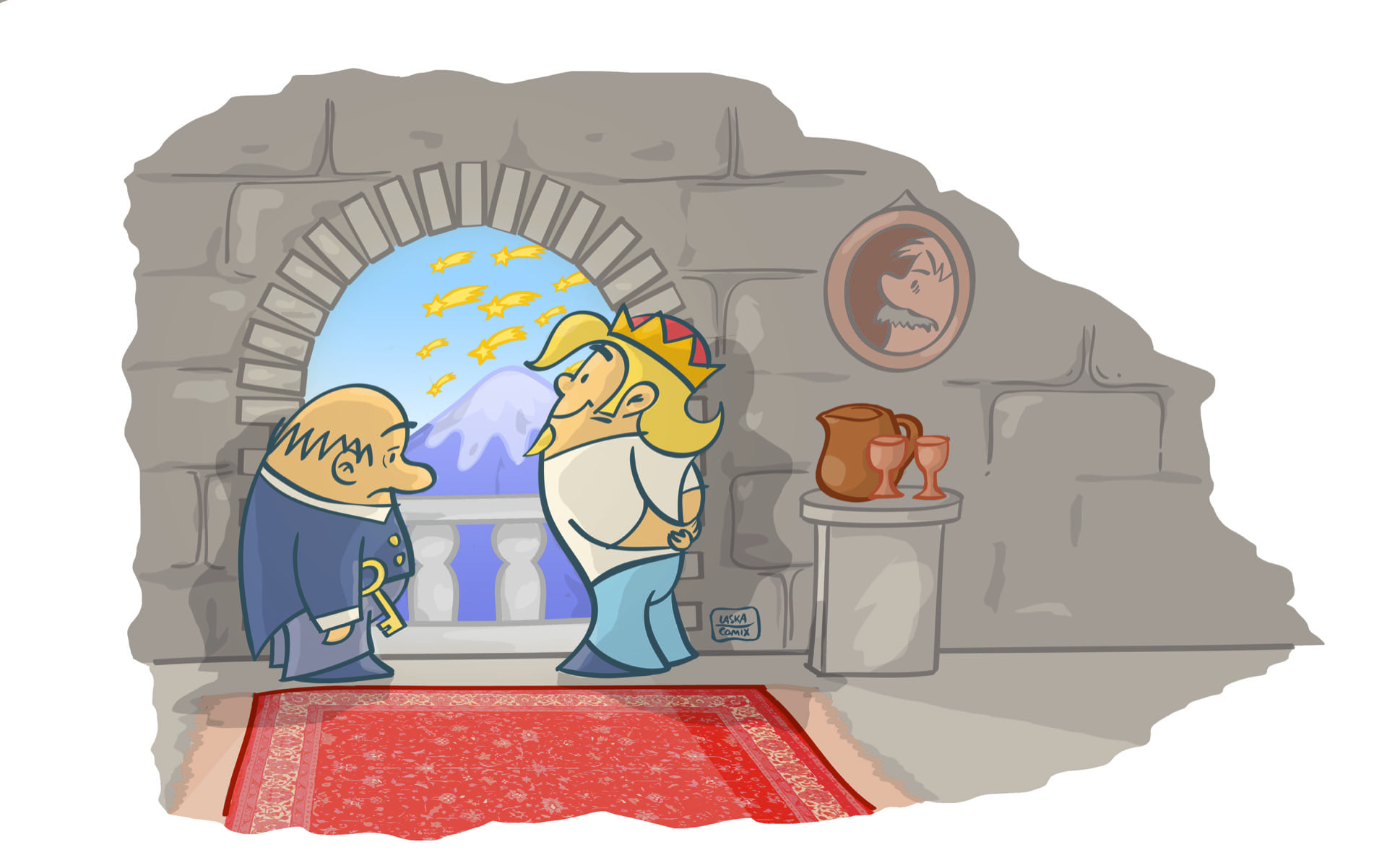
Chapter 1: Fanfares and Trumpets
All was not well in the kingdom. For months now, there had been no tourists, and even the royals from next door, who had been over for barbecues just last summer, were notably absent. Prince Starsalot’s worries grew just as much as the hair his treasurer lost worrying. After all, as minister of tourism, Starsalot was in charge of the country’s sole source of income: the falling stars appeared, like clockwork, every Tuesday night, granting visitors one wish each. The view from Mount Nowlook! - right next to the castle - offered the highest rate of wishing-upon-a-star fulfillment: 87.42 percent, two-tenths of a percent more than all of the competitors! Half the kingdom was very proud.
Still, Mt. Nowlook! had been almost deserted for the last couple of months; the number of tourists had trickled down to barely any. This was happening despite the fact that the royal family, first and foremost Starsalot’s father, had tried everything to attract tourists! Big posters advertising Mt. Nowlook! hung in the streets. Hundreds of heralds roamed the neighboring countries, trumpeting their vuvuzelas - louder than anyone else. The intermissions between theater performances were booked solid with commercial court jesters. But it was to no avail.
“Something must change,” said Sir Coin, the treasurer, just like he did every night at supper. “We have to do something, your Majesty, or else we’ll go broke.”
The prince, who had been looking dreamily out the window, took a deep breath and smiled: “Coiny, we’re gonna cancel everything. I don’t know what dad was thinking. Get them back home! Tear down all the posters! Cancel the ad breaks! Pronto!”
Sir Coin looked down at his soup and then, with one eye, shot a glance at the prince. “Very … uhm … well, your Majesty,” he said and murmured to himself: “It cannot possibly get any worse.” Starsalot’s smile grew bigger as he pat him on the back. “Hey! Coiny! No worries. Tomorrow we’ll be off. Slaying dragons.”
At 5 am sharp the next morning, Prince Starsalot woke up his treasurer. “Coiny! Get up! Get on your horse, adventures are calling!” - “Your Majesty, would you mind explaining …” - “No problem. Yeah. Listen. Yesterday morning, I found a book in that old oak tree behind the stables. Is called One Simple Tr…, cannot read the rest, but this must mean Treasure! No idea how it got there, but hey! Who cares! It says in the cover blurb that there’s a magical thingy to turn knowledge into gold. It’s buried somewhere in, uh, Webonia or something. There’s even a treasure map! It’s real for sure! We’re gonna get that thing, Coiny. Hah! Off we go! To the gold!”
“Very well your, uh, Majesty.” - They saddled their horses and got on their way. In the evening they set up camp, and in the flickering light of the fire, Starsalot read aloud:
Dear reader! I’m writing these words in the hope that they will fall on fertile ground. Mankind has collected an immeasurable amount of knowledge. This knowledge is invaluable; its worth is more than gold because every grain of knowledge can turn into a field of gold. But be aware: not every lecturer is a teacher, and not every learner is a student. Your journey begins with the single most important question: “What have you, dear reader, learned within the last seven moons? When were you a student and what have you learned that helped you on your path?”
“What the …?” pondered the treasurer for half a second, and fell asleep.
Exegesis: KNOWLEDGE IS GOLD
The world of online advertising has quietened down over the last few years. Sure, there’s still an awful amount of incorrigible barkers, loudly announcing CLICK! HERE! NOW! with their blinking banners and annoying the hell out of readers with their sudden SUBSCRIBE! TO! OUR! NEWSLETTER! pop-ups and all the other assorted annoying stuff, which used to work fine, until …
… well, until users began to understand and not just consume the internet.
Sure, everything is moving at a faster rate than ever before. And yes, with one click, one can find almost anything and buy it, too. Yet one ancient currency remains the most valuable of all - it’s as important in business as it is in everyday life: trust. And despite, or maybe because of the high-speed internet, trust today is gained even slower than before.
This shouldn’t come as a surprise, really: if there’s an artificial sensory overload, we humans begin to yearn for something familiar, something … well, human.
The king’s vuvuzelists are yesterday’s news. Starsalot says goodbye to the old and rusty world of advertising. Almost fifteen years after Cluetrain, word has finally gotten around that one cannot just talk the talk. You need to walk it, too.
Online dealers, companies, bloggers, email marketeers, human beings - they’ve begun to listen. Instead of shouting, they write. And readers, users, customers - they’ve learned how to distinguish genuine authenticity from fakesters, and many are becoming authors themselves. Now more than ever before, salesmen have to win and keep their audience’s hearts if they don’t want to get blown off the map like tumbleweed.
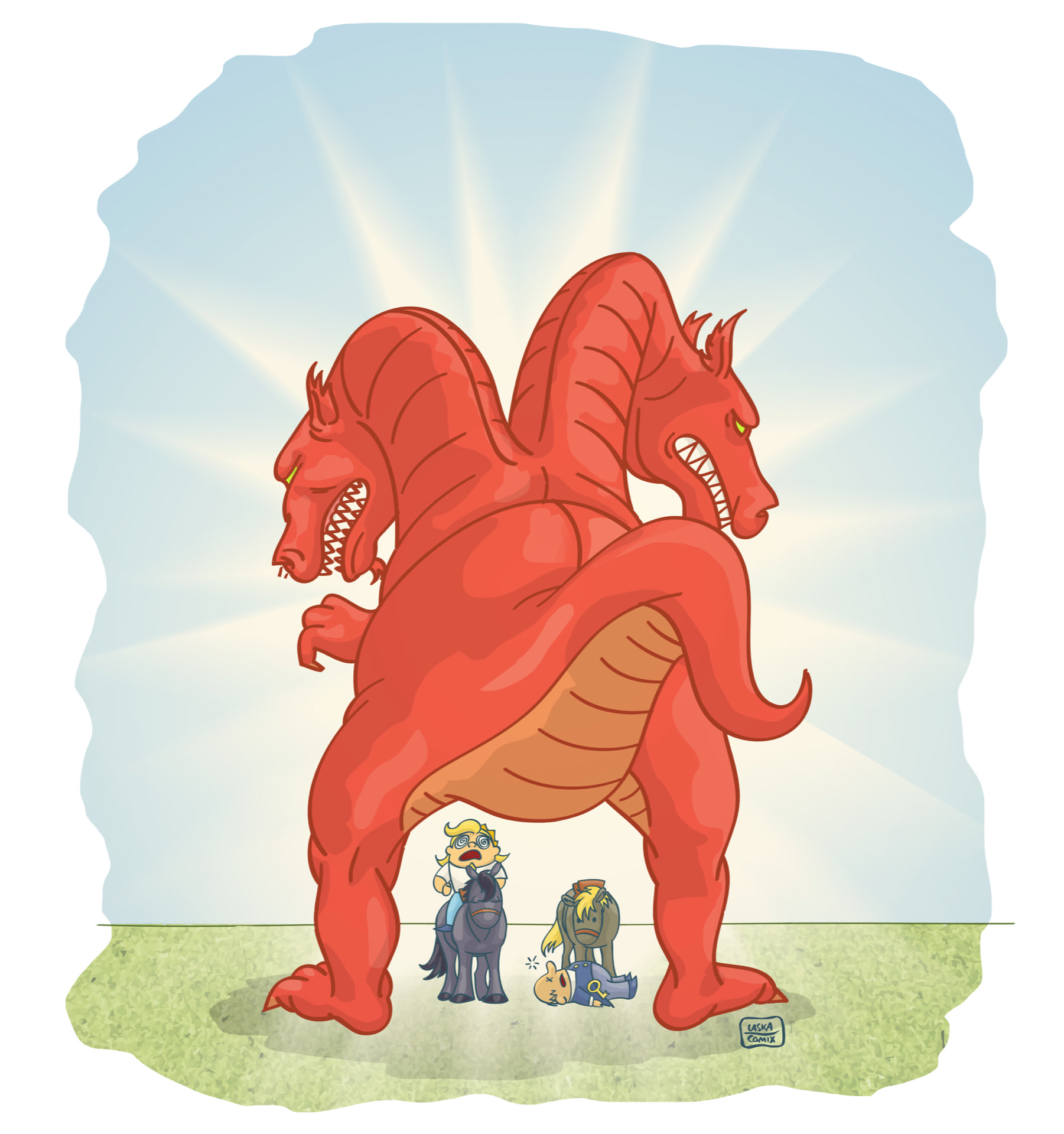
Chapter 2: Moments
The Forest of Fogs swallowed up the clopping of the horses’ hooves. “Your, uhm, Ma-jes-ty?” whispered Sir Coin. “Majesty? When you said we’re going slaying dragons … surely it was … a joke?”
“D’oh, Coiny! Whoever wrote that book cannot possibly mean his stories literally. Dragons? That’s something for fairy tales, ha! Hah!” He took out the book. “Here, listen.”
Dear reader! Before you can turn knowledge into gold, you have to slay three dragons. They will visit you without warning and … GNORF
“Your Majesty? Did you just say Gno…” the treasurer began, and froze with terror. A dragon had appeared right before them, both of its heads swinging at arm’s length in front of their faces. It was staring at them, and for a moment they just stared back.
Starsalot grabbed his sword - being tourism minister had made him somewhat of an experienced fighter. “Attack!” he shouted, but Sir Coin did not hear him: He had fainted. “Oh great,” thought Starsalot, ensnared by the dragon’s eyes which appeared to become bigger and bigger with every second and, suddenly, blinked. What Starsalot saw pierced his marrow and bone.
The dragon’s eyes seemed to fuse with Starsalots’. He saw himself, walking back home through the Forest of Fogs with a heavy heart and heavy steps, alone and bent, the shine of optimism gone from his eyes. Instead, they were filled with fear: How would the king react, what would the people say? Tourists would abandon Mt. Nowlook!, revenue would dwindle to nothing and the kingdom would fall to pieces! The book’s author had tricked him; Starsalot should’ve known that it couldn’t be this easy! Turn knowledge into gold? Hah? Hah.
The dragon, realizing that his plan was working, grunted gleefully. But Starsalot composed himself and said, his voice wobbly at first, the clearer and louder, “and what do you think you’re doing? Those who laugh first usually lose. Don’t you know that? Listen, sucker. I am the prince. I am king of my thoughts and only I decide what I’m scared of. Now go away with your second-rate theater. Not. Me.” Starsalot closed his eyes, took half a breath and with a swift cut, removed the beast’s heads.
○ ○ ○
“Brrr!” The treasurer got up, shaking off the water with which the prince had splashed him. “Your Majesty? Does the book tell us what kind of dragons still await us?” Starsalot quietly browsed through the pages. “Lemme see, bro, so … yeah, apparently that was the Dragon of Fear. According to our esteemed author, there still are,” he lifted an eyebrow, “Idleness and Chaos. Oh grreat. Well, Coiny, there’s no avoiding it. We’re not afraid anymore, are we? Hah! Off we go!”
They got on their horses and started riding. They didn’t notice how loud the sound of the hooves echoed in the forest.
Exegesis: FEAR
“On the field of the Self stand a knight and a dragon. You are the knight. Resistance is the dragon.” - Steven Pressfield in The Art of War, his masterpiece on fear, especially creative fear, and how to defeat it.
Sometimes clients tell me, “oh come on, Mr. Maul! As a professional shrink, you should know that one needs to resolve fear. It’s not about defeating it!”
It’s true: Parts of the therapeutic and personal development scene do their best to let personal change appear in a mostly pleasant, pain-free and easy way. But when it is of vital importance, when the fear of the empty page or the “completely insufficient text that nobody will read anyway and OH MY GOD I AM A TOTAL FAILURE” starts gnawing at one’s own identity, then the solution needs to start at the origin of the problem. The dragon (who is - surprise, surprise! - part of your self) is facing you, and you need to kill it, now, immediately, no matter the price. If you don’t, it’ll haunt you for the rest of your life.
Say what? It’s already gnawing at your leg? Well then, turn around. Face it. Look deep into both eyes. Or all four of them, if it’s two headed. Draw your sword, charge, and kill.
With every dragon you slay, you uncover one more part of your authenticity. Those immortal parts of the dragon that are left? Keep them at arm’s length, until they don’t seem immortal any more.
And then write Yourself, whether it’s in a personal blog, the newsletter of the model train enthusiasts group or the ad copy for a wood screw company.
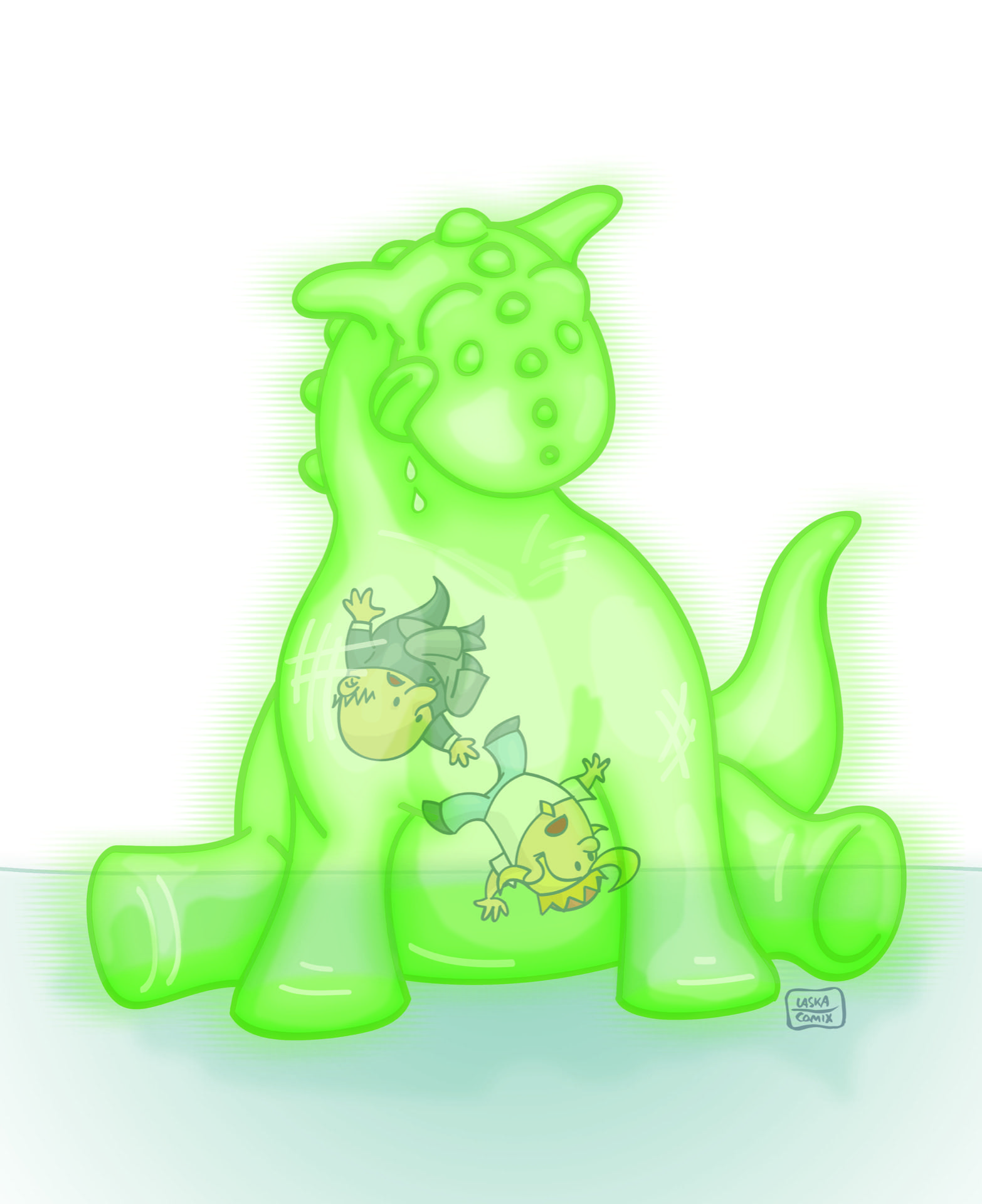
Chapter 3: Resistance is Fertile
The Forest of Fogs made way for a wide landscape: green meadows, soft hills and sunshine made Starsalot and Sir Coin almost forget what lay behind them.
“Coiny? We need to be prepared for the next dragon, okay? Ya know, we need to find this magic thingy to turn knowledge into gold. Listen: first of all, no fainting. Got that?” - “Yes, very well, your Majesty.” - “Secondly, attack immediately. No hesitating, not even for a second. And thirdly, we are not, - I repeat -, we are not afraid. Got that?” - “Yes, uh, very well, your Majesty.”
Thus they rode from sunset until the sun stood high up in the sky. At high noon, Starsalot started looking for a place to rest. “Coiny. Didn’t we leave the Forest of Fog this morning? Right? Why on earth is it still a horse’s length behind us?” - “Your Majesty, we … we … uh … apparently, we haven’t moved at all.” - “D’oh, smarty pants, this I can see for myself. But - how?” Starsalot looked around and shouted: “Hey! Hul-loo! Who dares to play games with us? Show yourself! We are not …” He turned to look at Sir Coin, reassuringly, “… not afraid at all! Hah!”
Quietly and without making a big fuss, a dragon materialized. “I’ll show you,” it murmured as it sat down on them like a big blob of jelly. Within seconds, Starsalot and Coin were caught head to toe, stuck within the dragon.
Starsalot grabbed his sword and wildly struck out in every direction, but to no avail. “Oh, go on …” murmured the dragon, “… just keep going.” Starsalot flung out wider and wilder, at times with one hand, at others with both. Soon enough, he was so exhausted that the sword fell out of his hand, reducing him to thrusting with his bare fists. “I’m … gonna …,” he wheezed, “get you,” but soon, he slumped to the floor. “Coiny, I’m … I’m not strong enough. We’re doomed.”
Sir Coin, who had quietly watched the scene unfold before his eyes, looked at the prince who had fallen asleep from exhaustion. Coin furrowed his brows. He thought. Then he began to slowly flail his arms. Slowly, the dragon-jelly began to wibble and wobble. Coin watched and picked up the pace until the entire dragon wobbled around him.
“What the hell, human?!” the beast shouted, but Sir Coin wouldn’t stop. With every move of his arms, the wobble turned into shockwaves that pulsed through the dragon’s body, rocking him like a ship in stormy seas. Finally and with a loud splosh, he collapsed, leaving behind nothing but a tiny, wobbly puddle.
○ ○ ○
“Your Majesty?” The treasurer tickled the prince’s nose with a daisy. “You may wake up now. The dragon is slain. The book says it was the … just a moment … ah yes, the Dragon of Idleness.”
“How? What? Coiny? Ha! Hah! Awesome!” Starsalot wiped the last of the jelly off his clothes. “We did a grrreat job, Coiny, didn’t we? Right? Ha! Hah! Let’s keep going!” - “Very well, uhm, your Majesty,” replied the treasurer, and the two quickly left the hills behind them.
Exegesis: THE DAILY WOBBLE
All those great famous authors, bloggers, commentators, personalities - those who earn large, 5-digits sums every month with “only writing” - have something in common. They all began, can you believe it, from scratch … and then just never stopped. Everyone who seems like an “overnight” success spent hundreds, and more often thousands of nights working really hard, writing, deleting, practicing … and never stopping.
“But I’ve been writing for three weeks now! And no one is reading my posts!” - As unbelievable as this sentence sounds, I’ve heard it often enough. Everything on the internet seems to move so fast and seems so simple. As mentioned before though, the single most important ingredient for success - trust - grows at the same pace, or even slower, than twenty or fifty years ago.
Starsalot, swallowed by the dragon, slashes away and exhausts himself until he can no longer fight and then gives up. Sir Coin, however, observes and adapts: which type of wobbling could work, and how? He sticks it out and acts consistently, until he wins.
How long do you need to persevere? When is it time to give up? There is no one right answer to that, but there are a few rules of thumb: If it’s important to you - the topic, the product, the enterprise, you yourself -, then stick with it. If not? Off with it. Gold only comes to those who are happy.
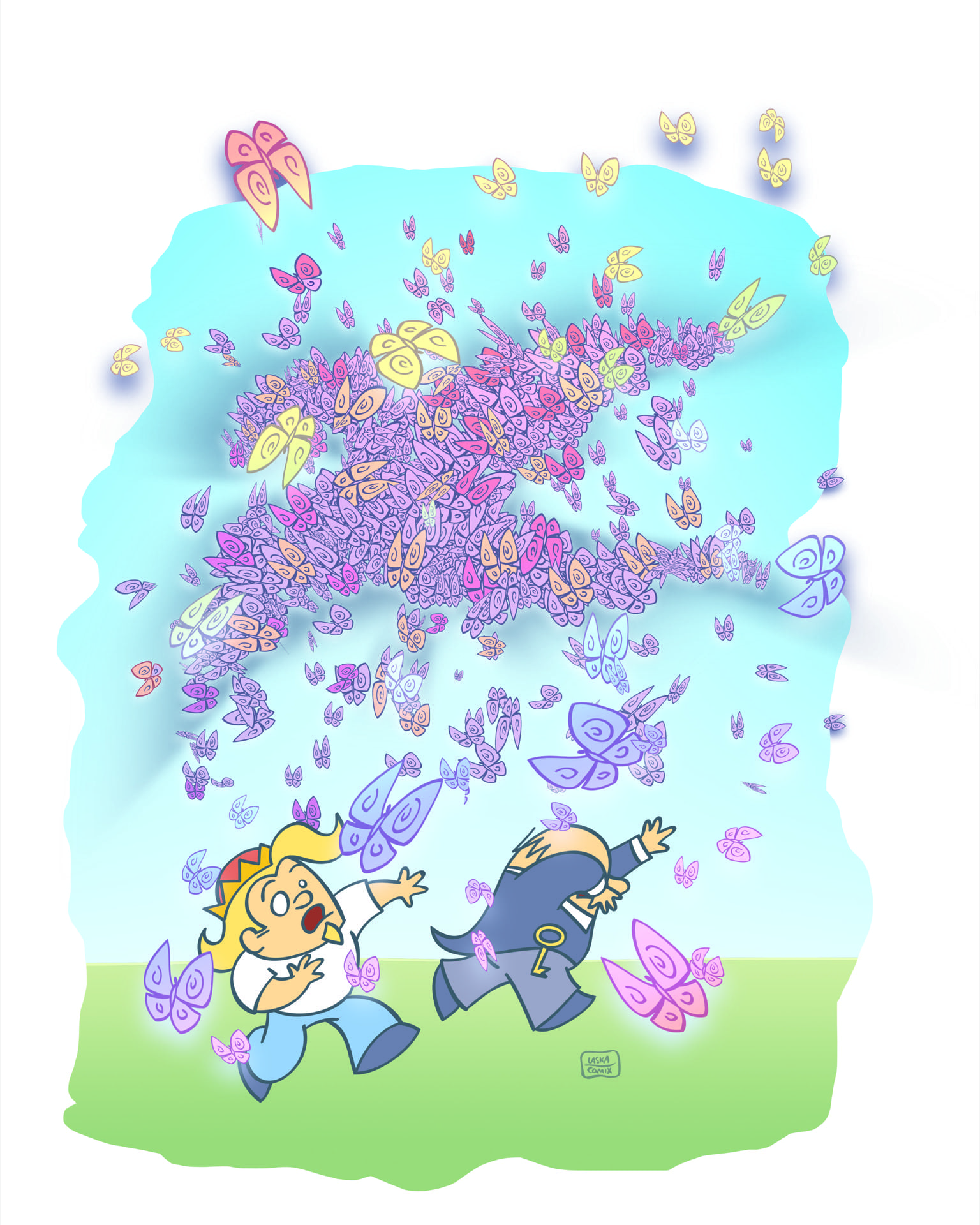
Chapter 4: Trouble-Shooting
“Are we there yet?” moaned Sir Coin. Starsalot looked at the map. “Yeah, almost there. That is, if …” - “… what, your Majesty?” - “If we slay the next dragon. Chaos, you remember?” The treasurer was quiet. Chaos was not his forte.
The meadows seemed to go on forever as the royal horses trotted over countless flowers, first fast, and then, bit by bit, slowing down. “Hey! Keep going!” Starsalot ordered, but it was pointless. Eventually, the horses stood there as if they had grown roots, dazed by the flowers’ scents; the riders dismounted.
The moment their feet touched the ground, the meadow seemed to explode into the sky. “Coiny! Butterflies!” Millions of brightly colored critters fluttered around them and up into the sky, forming what looked at first like an enormous cloud. It curled and quivered, as if tossed about in a storm, then changed forms: One moment it was a star, then a ball, and then it looked just like a piece of gold.
“Your Majesty! I can’t just you … because …” - “I … me … cannot … either!” Starsalot and Sir Coin stumbled, distracted and confused by the gigantic swarm of butterflies. Then, with a tiny gurgle, the cloud transformed into the shape of a dragon. “Cha…” - “…os!” they screamed.
The Dragon of Chaos fluttered in the sky right in front of them. Starsalot and Sir Coin looked at each other for a second and then, in the hopes of escaping, started running. But the dragon followed suit, fluttering wildly. With every step they took, they became more confused, ran to the left, to the right, through the middle, tried catching single butterflies and chasing them away with strikes of their swords, with absolutely no success.
Exhausted, they stopped. “Chaos, if the, dragon slaying, but, we’re out, think of. Us.” - “Very, Majesty. Your!” They looked at each other and nodded. Then Starsalot made a step to the left and Coin took one to the right. With every step they took, the butterfly dragon cloud, trying to hold both in captivity, stretched a bit more, becoming wider and more flat. After a while, they were so far apart that they could barely make out each other. “Working, it is!” shouted Starsalot.
Indeed, the dragon had turned into a long string of butterflies, stretching out like pearls on a necklace sorted by color. “Holy stars! The dragon made himself pretty!” Sir coin said, taking one last step. The last butterfly that was still fluttering about joined the long string of butterflies, and they all floated to the ground gently. The dragon was gone, and all that was left was a long row of brightly colored flowers on the meadow.
○ ○ ○
“Well, I’d say we can scratch that off the list, right? Ha! Coiny! It says in the book that the magic thingy can be found in the Cave of Wisdom, right next to the third oak from the left. Just like in a fairy tale, right? Ha! Hah!” Starsalot pat Sir Coin on the shoulder. “There! I see the forest near the horizon. Here we come!”
The dragon slayers quickly rode straight ahead.
Exegesis: STRUCTURE
“Mr. Maul, I’m no writer!” is another of those sentences that I hear quite often, and usually, the only reason why people believe that they cannot write is that they believe that “one has to be born a writer.” But have you ever told a carpenter, “The closet you built looks awesome! But let’s be honest, you’ve been able to do this since you were born, eh?”
Sitting in front of a piece of paper or a screen and waiting for the muse to come by to inspire your fingers to dance over the keyboard means waiting in vain. Countless “gifted” authors (actually, especially those) tell stories of dramatic inner battles they had to fight to get their words onto the page.
A blog post, web copy or a tweet off the cuff; none of them are a magnum opus. Most texts that are important for business follow a clear structure, and when you sit down at your computer without a structure to “write something,” you’re wasting your time.
So, how can you do a better job? Here’s one of many simple tricks for writing, say, ad copy: fantasize how your perfect reader looks. How do you put your argument together to sell your product to that one person? That’s the thinking that’ll lend structure to your writing. Also, and this is essential, keep looking into your client’s eyes through your monitor. Is he still there? Is he bored? Does he want to click on the “buy now!” button yet? This is how you get through the structure, sentence by sentence. Upload it. Finished. Oh, by the way, 80% is good enough. Perfectionism kills. Stay cool.
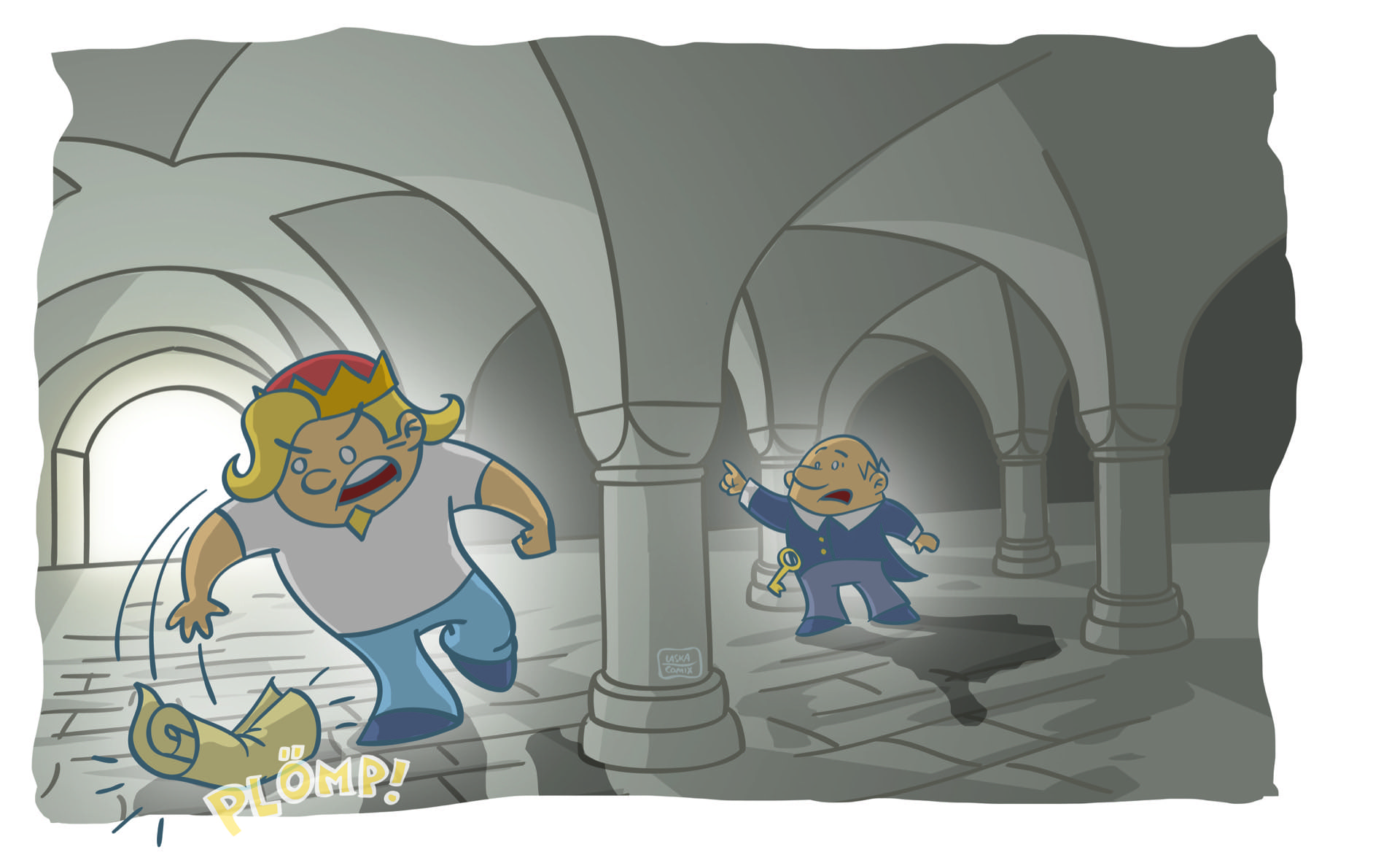
Chapter 5: Making a Point
“What? It’s this easy?” Starsalot shook his head again and again, and even a third time. He walked back and forth, breathing faster and harder. “That’s all there is? Aaaargh!” With a loud scream, he threw the scroll onto the floor.
“Your Majesty, please let’s read the entire thing again - just a bit more closely.”
“Fiddlesticks! Read?! Why did that pen pusher make us meet those dragons if it’s really this easy? Got a smart answer for that, Coin? Well? Well?” Sir Coin straightened up, composing himself. “Your Majesty might remember that we weren’t sure if we would be slaying dragons when we set off on our journey.” - “Yeah. So what?” - “Might your Majesty consider that your father’s plans were not his finest?”
“Sure Coiny, my old man is old-school. Having guys running around with vuvuzelas, shouting everything out into the world, it just doesn’t work anymore! That’s why we set out on our quest. Yeah, well, fine,” he took a deep breath, “read it to me again, Coiny. Slowly, please.”
The treasurer read again, slowly:
To turn knowledge into gold, you must first overcome fear, idleness and chaos: become free to share your most valuable knowledge, without fear that it could be to your disadvantage. Be quick and make it a habit to share your knowledge without idleness slowing you down. Wherever you are: sort your thoughts so that you’ll always find order in chaos, because there’s always order to be found even in the biggest chaos. Do this each and every day, wherever you are, and smile all the while that you’re doing it. Narrate stories about everything that means something to you. And lo and behold, your knowledge turns into gold.
Starsalot’s features relaxed at last. “Ya. Got it. Man, why didn’t I think of this earlier! The old dude who wrote this book! Ha! Yeah, he knows the good stuff. How else could he have drawn us here, ha? Hah? We can do it, too!” The treasurer nodded and smiled warmly at the prince. “Your Majesty, we should get on our way.”
“No need to say that twice! Ha! We ride!” They rode for a day and a night without rest, and then another day, all the way talking: about the history of the kingdom and the falling stars, about wishes and wish quotas and everything that came to their minds about what they had experienced and learned over the last couple of decades."
○ ○ ○
When Starsalot put up camp and laid down to sleep, his eyes shone brightly. Yes, once they got back, he would become a teller of stories. Sir Coin’s eyelids fluttered in his sleep: he dreamed of Mt. Nowlook! and how it reflected the moonlight and was full of tourists, gazing at the falling stars.
Exegesis: WE ARE STORIES
Some scientists put forth that the ability to narrate stories played an important part in evolution and helped human beings become human.
Many of us modern beings grew up listening to bedtime stories; looking at picture books made of thick paper; reading comics underneath the blanket; reading books that swallowed entire days of the summer holidays, just like that, and then another one.
Stories keep us together - as a person and as a society. They help us to understand and genuinely grasp the context; to give our life, and the lives of others, structure and meaning.
Many of the archetypal structures of stories are familiar to us all: boy becomes knight, slays dragon, saves princess. Man meets woman, they hate each other, then fall in love. Evil threatens to destroy the world, but Good prevails.
When misused, these structures are like an ugly scaffolding, a prime example being movies that use structure only as a skeleton for shallow visual effects.
When you learn how to use narrative structures properly, you plant a network of roots that can grow into anything. Just don’t forget to pack a chainsaw - and bonsai scissors. Nobody likes scrub.

Chapter 6: Twilight
The sun had just gotten up and begun rising into the morning sky as the two heroes reached the borders of their kingdom. They rode through the castle gates, and once they were in, Starsalot dismounted and ran to the king’s bedchamber.
“Hey. Dad? I know it’s early - just listen. We know what to do. We’re going to save Nowlook!. Please retire.” The king threw him a sleepy glance from underneath his night crown and blinked. Then he turned around, went back to bed and fell asleep, breathing deep and quietly.
“Okay, that’s done. Coiny? Coinyyyyyy? Summon the men with the posters and the vuvuzelists and the advertisement jesters!” Starsalot briefed the entire personnel whom he had sent on holiday before his journey. “Hey. No more shouting. Listen.”
And so Starsalot began to speak and continued until late at night. He told them about when he watched the falling stars for the very first time as little prince. How, as a boy, he laid sleeplessly in his bed and counted the falling stars before falling asleep. How he played with Princess Sunflake from the neighboring kingdom in the sandbox and baked falling-star sandcake. How he increased his allowance by selling tickets to Mt. Nowlook! in the holidays. What he learned about the falling stars and the wishes from the people coming to watch them. And Starsalot told of each and every story he had heard about the mountain and the stars in all those years of his life.
Captivated, his audience sat in a half-circle around him. With every story, their eyes and hearts seemed to grow a little bit bigger. They started to realize what it actually meant to wish upon a star. And they felt what it meant to have that wish fulfilled. They understood.
Even when Starsalot was so tired that he could barely talk anymore, his eyes shone. “And all this, dear colleagues, dear friends, is only a tiny, tiny glittering from all the gold we carry inside of us. This is what will attract tourists like magnets. But now, we should get some sleep: tomorrow, you’ll go out and carry our stories to all the countries.”
And that’s what happened. Every day, Starsalot and his treasurer sat down and wrote down their stories, and every day more and more visitors came to tell their stories. After a few weeks, the streets leading up to the peak of Mt. Nowlook! became alive again. The meagre trickle of tourists they had left behind when they embarked on their journey turned into a river again, and before they knew it, there were long queues around the woods at the foot of Mt. Nowlook! filled with people telling their wishing-upon-a-star stories.
The king, however, enjoyed his retirement and spent his days attending to his rose garden. Oh, and the neighboring royals? Well, they came to visit again - and they brought Princess Sunflake with them.
Exegesis: SELL EXPERIENCE, NOT PRODUCTS
Money is an agent for experience: I don’t buy chocolate because I want to own it. I don’t buy a chair to own it either: The chocolate is eaten and enjoyed; the chair is sat on, and admired if it’s beautiful. I don’t exchange money for the chair or the chocolate itself, but for the experience I’ll have as a result of buying them.
What’s logical to the buyer of a product - even if he is rarely conscious of it - has to apply to the seller, too. Do you rent storage space for people who have more stuff than they have room for? No; nobody rents space, but if you promise your customers the experiences they’ll have, they’ll listen: being able to finally invite guests over again, because there’s actually enough room in the living room! (The question if it wouldn’t be better to simply throw the stuff out is answered by the coaching industry, which in turn promises new experiences.)
And, d’oh! Experiences are conveyed through stories. That’s an old hat! Think of your own stories as well as your clients’ and especially how they influence each other. Only when the first customer has made his purchase does the story of your product begin. Until this happens, it’s a mere fantasy, no matter how much money and brains you have put into its development.
Use this opportunity. Collect and narrate stories that convey experiences - starting now. It will help you sell your product, which in turn will create new stories. It is an unnecessary detour not to sell a product as an experience.
○ ○ ○
I’d like to thank my editor Regine Rachow; Elke Reinhart, who brought Starsalot to life with her beautiful illustrations; the brave beta-readers; Laetitia Rezay for the initial translation into English; and my son for his brilliant, but ultimately rejected, idea to name our hero King Fartybox.